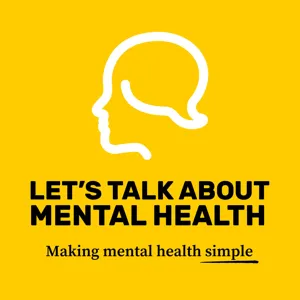Podcast Summary
Prioritizing mental and physical health, discovering what truly matters, and seeking support when needed: Emphasize mental and physical health, find meaning in life, and reach out for assistance when needed. Modern society's challenges, like cancel culture and tech addiction, impact mental health. Online therapy services and innovative business solutions can help prioritize well-being.
Prioritizing mental and physical health, discovering what truly matters, and seeking support when needed are essential for personal happiness and growth. BetterHelp's online therapy services offer an accessible and affordable solution for individuals looking to prioritize their well-being. Additionally, influential scholar Jonathan Haidt discusses the impact of modern society on mental health in his book, "The Anxious Generation." He emphasizes the importance of addressing issues like cancel culture, addiction to technology, and the impact of social media on children. Furthermore, companies like Mercury provide innovative solutions for startups, offering banking and credit cards with an effortless experience, giving businesses greater control and focus without compromising security. In the ever-changing world, it's crucial for individuals and organizations to adapt and prioritize their well-being, seeking resources and knowledge to navigate the challenges and opportunities that come their way.
Acknowledging and overcorrecting during a crisis: Transparency and accountability are key during a crisis. Overcorrecting, even with financial losses, can help rebuild trust and lead to a stronger comeback.
During a crisis, acknowledging the problem, taking responsibility, and overcorrecting are crucial for managing the situation effectively. The speaker emphasizes the importance of transparency and accountability, using examples from business and royalty. Companies like Tylenol and airlines have shown that overcorrecting, even if it comes with financial losses, can help rebuild trust and ultimately lead to a stronger comeback. However, failing to acknowledge and address issues promptly, as in the case of the Palace Comms people handling Kate Middleton's health crisis, can lead to unnecessary public scrutiny and negative consequences. Boeing, currently facing a crisis with their 737 Max planes, is attempting to overcorrect and regain trust by addressing the issues and implementing changes.
Empathy and communication in relationships: Empathy and effective communication are vital in managing relationships. Recognize and respond to others' feelings, acknowledge their achievements, and validate their experiences to build strong connections.
Effective communication and empathy are crucial in managing relationships, whether personal or professional. The Boeing crisis serves as an example of how a lack of consideration for others' feelings can lead to significant consequences. In our own lives, it's essential to recognize and respond appropriately when someone is upset or angry, rather than defending ourselves or going on the offensive. Providing evidence of someone's life, acknowledging their achievements and noticing their sadness, is what people want from us as friends, partners, or colleagues. By doing so, we make their experiences feel real and valued. The speaker shares how his mother's role in his life provided evidence of his successes and made them feel cemented. Now, as she's no longer present, he cherishes new relationships that offer the same sense of validation. Ultimately, being there for others, noticing their lives, and giving evidence of their experiences is a key aspect of being a good friend, partner, or leader.
Acknowledge feelings, take responsibility, and overcorrect: When dealing with upset individuals, acknowledge their feelings, take responsibility for any role, and overcorrect to maintain relationships and create lasting impact
When dealing with upset individuals, it's essential to acknowledge their feelings, take responsibility for any role you played, and overcorrect to make things right. This approach not only helps maintain relationships but also ensures that the people who matter to us are noticed and appreciated. As Jonathan Haidt emphasized, life is about more than just personal accomplishments; it's about the connections we build and the evidence we leave behind. By acknowledging issues, taking responsibility, and overcorrecting, we create a lasting impact on the lives of those around us.
Social Media and Mental Health in Gen Z: Critical Period of Brain Development: Exposure to social media during puberty can increase anxiety and depression in Gen Z, potentially causing long-term damage to mental health.
Professor Haidt's research on the anxious generation, specifically focusing on Gen Z, is gaining widespread attention due to the timeliness and relevance of the topic. Puberty is a critical period for brain development, and exposure to social media during this time can have detrimental effects on mental health, leading to increased anxiety and depression. The millennial generation, who did not get smartphones and social media until later in life, generally fares better in terms of mental health. The damage caused by social media during the sensitive period of culture learning can be significant, and it may be difficult to undo the negative effects once they have taken hold. Parents of older Gen Z children should be aware of these risks and take steps to help their children navigate the digital world in a healthy and balanced way.
Excessive use of technology harms young people's mental health: Social deprivation, sleep deprivation, and attention fragmentation are harms caused by excessive technology use that negatively impact young people's mental health. To mitigate these harms, young people can establish effective routines and limit notifications.
Young people's use of technology, particularly social media, can lead to several foundational harms that negatively impact their mental health and well-being. The most concerning of these harms is social deprivation, as excessive screen time pushes out face-to-face interactions and hinders the development of essential social skills. Another significant harm is sleep deprivation, which can lead to mood swings, anxiety, and memory issues, especially when devices are used in bed before sleeping. Attention fragmentation, caused by the constant distractions of technology, also negatively impacts focus and executive function. While these harms can seem overwhelming, there are steps young people can take to regain control of their attention and improve their moods, such as establishing effective morning and evening routines and limiting notifications.
The impact of technology on focus and goal achievement: Constant distractions from technology can negatively impact focus, lead to poorer life prospects, and potentially result in problematic use or addiction, hindering the development of essential social skills through offline friend groups.
The ability to focus and stay on task, which is crucial for achieving goals and success in life, can be negatively impacted by constant distractions from technology such as social media and video games. This issue, referred to as attention fragmentation, can lead to poorer life prospects, including financial struggles and inability to accomplish goals. Furthermore, a significant percentage of young people may develop problematic use or addiction to these technologies, interfering with their relationships and academic performance. It's important to note that these online friend groups, while easy to enter and exit, don't compare to the formative, long-term impact of offline friend groups, which help shape our identities and teach us valuable social skills. As a tribal species, humans evolved to live in small groups and form strong bonds, which can't be easily replicated online. The offline friend groups we form in our youth, often through shared activities and experiences, play a crucial role in our development and provide us with essential social skills that last a lifetime.
The decline of free play and rise of digital devices impacting childhood development: The loss of unsupervised free play and increase in digital device use have disconnected children from social norms and essential skills for healthy development, including rule-making, relationship management, and risk-taking.
The loss of unsupervised free play and the rise of digital devices in childhood have contributed to a sense of normlessness or disconnection among young people, particularly boys. This shift, which occurred most significantly between 2010 and 2015, has had a profound impact on childhood development. Emile Durkheim's research on suicide in the late 1800s provides insight into this issue. Durkheim observed that people who were tightly bound to communities had lower suicide rates, while those with more freedom were more likely to feel disoriented and disconnected. This research underscores the importance of social norms and connections for healthy development. The decline of free play and the rise of digital devices have disconnected children from the real world and made it harder for them to learn essential skills like rule-making, relationship management, and risk-taking. These skills are crucial for healthy brain development and future success.
The Digital Age's Impact on Young People's Mental Health: The digital world's fragmentation of social interactions can lead to feelings of despair, disconnection, and depression among young people, intensifying the challenges of adolescence. We must reconsider our approach to protecting children, balancing offline and online safety.
The digital world's atomization and fragmentation of social interactions have led to an increase in feelings of despair, disconnection, and depression among young people. Emotional vulnerability online, combined with the loss of traditional offline social structures, can trigger mental health issues. We need to reconsider our approach to protecting children, as we overprotect them offline and underprotect them online. The digital age has intensified the challenges of adolescence, making it crucial to address these issues and promote healthy online habits.
Social media's impact on young people's lives: Social media can cause stress and pressure, exploiting psychological insecurities. Tools like Greenlight and open conversations help young people make smart financial decisions. Prioritize real-life experiences over virtual ones for a healthier lifestyle.
Social media platforms can significantly impact young people's lives by causing unnecessary stress and pressure to manage their online reputations. These platforms intentionally exploit our psychological insecurities, making us live on thin ice. On the brighter side, there are solutions to help young people make smart financial decisions at an early age, such as the Greenlight debit card and money app made for families. Meanwhile, for adults, it's essential to have open conversations with children about the importance of financial literacy and provide them with the right tools to learn. As for traveling, Virgin Atlantic offers a memorable experience from the moment you check-in, making every journey a pleasure. Going back to the topic of social media, it's crucial to be aware of its potential negative effects and take steps to mitigate them. Overall, it's essential to prioritize real-life experiences and connections over virtual ones, ensuring a healthier and more balanced lifestyle for young people.
Four steps to improve youth mental health: Encourage no smartphones before high school, no social media till 16, phone-free schools, and more free play for better mental health and academic performance
Addressing the issue of youth mental health, particularly anxiety and depression, requires collective action. John Haidt, a moral and political psychologist, suggests four steps or norms to help liberate kids from the social action problems caused by excessive use of smartphones and social media. These norms include: no smartphones before high school, no social media till 16, phone-free schools, and more free play independence and responsibility in the real world. While some of these steps may face resistance, particularly from parents, the trend of phone-free schools is gaining momentum, with countries like the UK and Australia already implementing this policy. The benefits include improved educational outcomes and happier, healthier kids.
Impact of Modern Childhood Experiences on Mental Health: Jonathan Haidt's research explores how modern childhood experiences contribute to an epidemic of mental illness
That childhood rewiring, as discussed in Jonathan Haidt's latest book, is causing an epidemic of mental illness. Haidt, a professor at New York University, shared insights from his research on this topic during the conversation. His work explores the impact of modern childhood experiences on mental health. Haidt's colleagues congratulated him on his new book, and the discussion was facilitated by Caroline Shagran. The episode was produced by Jennifer Sanchez and Drew Burrows, and listeners are encouraged to tune in for more thought-provoking content on the Prop G pod and the Box Media Podcast Network.






